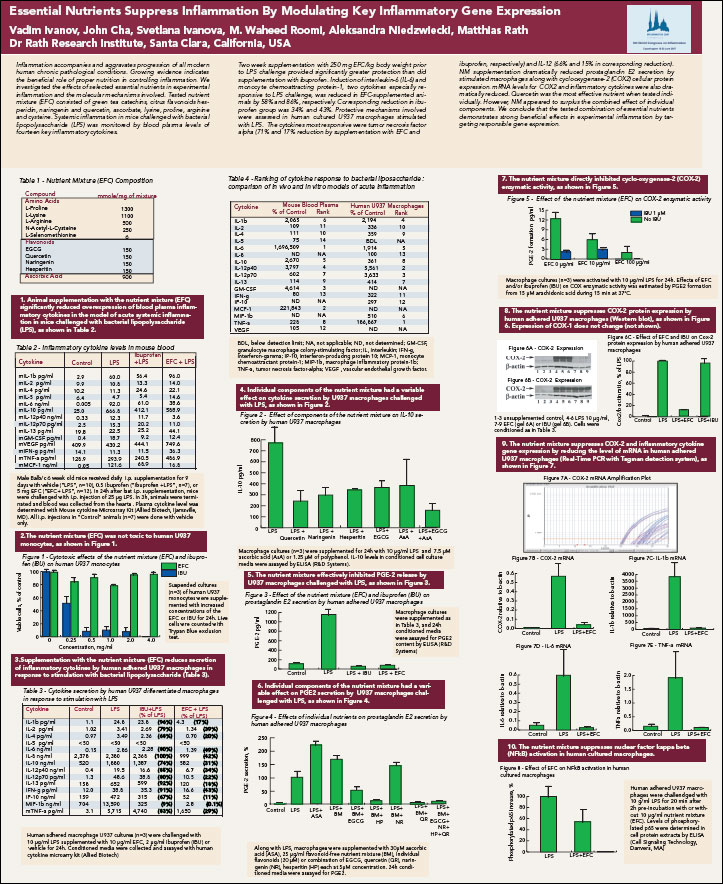V. Ivanov, J. Cha, S. Ivanova, M.W.Roomi, A. Niedzwiecki, M.Rath
Dr. Rath Research Institute, 1260 Memorex Drive, Santa Clara, CA 95050
Presented at:
8th World Congress in Inflammation; Copenhagen, Denmark; June 16-20, 2007
Published in:
Inflammation Research, volume 56, supplement 3, June 2007, page S471 Poster #P12.05
Abstract
Introduction:
The process of inflammation accompanies the progression and aggravates the outcome of all modern human chronic pathological conditions. There is a growing body of evidence of the beneficial role of proper nutrition in controlling inflammation.
Objective:
We investigated whether supplementation with selected essential nutrients would be beneficial in experimental inflammation and the molecular mechanisms involved.
Materials and Methods:
The tested nutrient mixture (NM) consisted of green tea catechins, citrus flavonoids hesperidin, naringenin and quercetin, ascorbate, lysine, proline, arginine and cysteine. The development of systemic inflammation in mice in response to challenge with bacterial lipopolysaccharide (LPS) was monitored by blood plasma levels of fourteen key inflammatory cytokines.
Results:
Two-week supplementation with 250 mg NM/kg body weight prior to LPS challenge provided protection significantly greater than the reference supplementation with ibuprofen. Taken as illustrative example, the induction of the two cytokines most responsive to LPS challenge, interleukin-6 (IL-6) and monocyte chemoattracting protein-1, was reduced in NM-supplemented animals by 58% and 86%, respectively, whereas corresponding reduction in ibuprofen group was 34% and 43%. Protective mechanisms involved were assessed in human cultured U937 macrophages stimulated with LPS. The most responsive cytokines from the panel in this model were tumor necrosis factor alpha (71% and 17% reduction by supplementation with NM and ibuprofen, respectively) and IL-12 (66% and 15% in corresponding reduction). NM supplementation dramatically reduced prostaglandin E2 secretion by stimulated macrophages along with cyclooxigenase-2 (COX2) cellular protein expression. mRNA levels for COX2 and inflammatory cytokines were also dramatically reduced. Quercetin was the most effective nutrient when tested individually. However, NM appeared to surpass the combined effects of individual components.
Conclusion:
We conclude that the combination of essential nutrients demonstrates strong beneficial effects in experimental inflammation model by targeting responsible gene expression.
Comment
Inflammation accompanies the progression and aggravates the outcome of all modern human chronic pathological conditions. Much evidence suggests that proper nutrition helps control inflammation. We investigated whether supplementation with a mixture of selected essential nutrients (NM) consisting of green tea catechins, citrus flavanoids hesperidin, naringenin and quercetin, ascorbate, lysine, proline, arginine and cysteine would be beneficial in bacterial liposaccharide (LPS)-induced systemic inflammation in mice. We monitored blood plasma levels of fourteen key inflammatory cytokines. Supplementation with NM prior to LPS challenge provided significantly greater protection than supplementation with ibuprofen. Supplementation with NM dramatically reduced prostaglandin E2 secretion by stimulated macrophages along with cyclooxigenase-2 (COX2) cellular protein expression. mRNA levels for COX2 and inflammatory cytokines were also dramatically reduced. These results are significant since they illustrate the superior protective anti-inflammatory effect of supplementation with the non-toxic nutrient mixture over the commonly used drug ibuprofen with its adverse effects.
